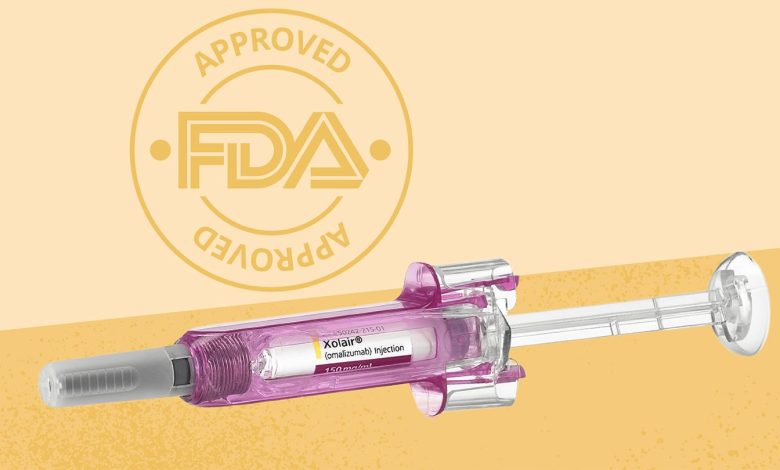FDA Clears Asthma Drug Xolair as Food Allergy Treatment

[ad_1]
The U.S. Food and Drug Administration (FDA) has approved the first medication to reduce severe allergic reactions triggered by accidental exposure to certain foods.
Xolair (omalizumab), an injected drug approved two decades ago for asthma, has now been cleared to help prevent severe and potentially life-threatening allergic reactions caused by foods like peanuts, milk, eggs, and wheat, the FDA said in a statement. It can be used to treat allergies to multiple foods in adults and children 1 year and older.
More than 1 in 20 people in the United States are allergic to at least one food that can trigger dramatic and potentially fatal allergic reactions, the FDA said in its statement.
Allergic Reactions to Food Pose Anaphylaxis Risk
One big concern with these allergies is the risk of anaphylaxis, a condition that can occur within a few seconds of exposure to certain foods and cause rash, nausea, vomiting, and difficulty breathing. If it’s not treated immediately — usually with an EpiPen that injects the drug epinephrine — anaphylaxis can cause unconsciousness and prove fatal.
“Xolair is a preventive treatment that can reduce the risk of allergic reactions in response to accidental ingestion of allergens, if used prior to allergen exposure,” says Sayantani Sindher, MD, a clinical associate professor of medicine at Stanford University in Palo Alto, California. “In contrast, rescue medications such as EpiPens are used after an allergic reaction is triggered and act to relieve the symptoms of allergic anaphylactic reactions.”
People with food allergies are typically advised to adopt a strict diet and avoid all exposure to the food that causes severe allergic reactions, and to carry epinephrine for emergencies. The only other drug approved for food allergies, Palforzia, is used only for peanut allergies in children 4 to 17 years old.
New Drug Can Prevent Multiple Food Allergies
Xolair is the first drug approved to treat multiple food allergies at once, the FDA said.
In clinical trials, 68 percent of patients taking Xolair for peanut allergies were able to consume up to 600 milligrams (mg) of peanut protein (about 2.5 nuts) without experiencing moderate or severe allergic reactions, compared with just 6 percent of people taking placebo injections, the FDA said. Results were similar for other foods, such as cashews, milk, and eggs.
It didn’t work for everyone, though. Overall, 17 percent of people who received Xolair injections in the clinical trials didn’t see any meaningful improvement in their tolerance for peanuts, for example.
The most common side effects with Xolair were injection site reactions and fever. In addition, the FDA warned that the drug carries a risk of anaphylaxis and should be initially taken under medical supervision where providers can manage that reaction if it happens.
To get continued protection from severe allergic reactions to trigger foods, people may need to continue treatment with Xolair throughout their lives — and also continue to carry EpiPens, says Zahida Maskatia, MD, the medical director at Latitude Food Allergy Care.
“It is important to know that Xolair does not work immediately and should not be used to treat an allergic reaction,” Dr. Maskatia says.
Epinephrine, on the other hand, is fast-acting and administered to treat severe allergic reactions, such as anaphylaxis, Maskatia adds. That’s because it works quickly to reduce throat swelling, open airways, and maintain heart function and blood pressure.
“Patients who are on Xolair may be safer, but since this is not a cure, they will still need to avoid their food allergens, and, importantly, they must always carry epinephrine,” Maskatia says.
[ad_2]




